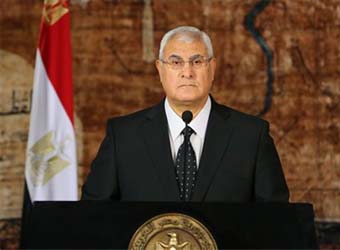Egypt’s interim President Adly Mansour issued Saturday a law regulating the country’s upcoming presidential elections.
The president approved controversial Article 7 in the law which makes the Presidential Election Commission’s decisions immune to appeals by other judicial bodies.
The intense debate around the law and the delays in finalising it have delayed the election process, which was expected to begin on 18 February, one month after the country’s new constitution was approved in a public referendum.
In a press conference announcing the issuing of the new law on Saturday, presidential advisor for legal affairs, Ali Awad, said the 60-article law grants to the Presidential Elections Committee’s decisions immunity from appeal by other judicial bodies “given the current circumstances.”
This stage, according to Awad, requires the swift completion of the presidential elections and the stabilisation of the position of the president after his/her election.
The final draft of the law included an extra article, which will also be added to the political rights law, which will prevent those who are currently facing trial or in custody pending trial on criminal charges from standing for presidential elections.
The draft law was sent by Mansour’s legal team to the State Council’s Department of Fatwas and Legislation on 17 February to be revised in legal and constitutional terms. Magdi El-Agati, chairman of the department, said revision of the final draft of the law was finished during “a stormy debate” on 3 March, and then sent to Mansour the next day.
Awad said the law lists six conditions for the eligibility of running for president. The conditions include that the candidate has to be Egyptian with both parents having only the Egyptian nationality, to hold a university degree, to be more than 40 years of age, and not to have a mental illness that would affect his/her job duties.
The law also states the candidates will have to pay a fee of LE20,000 ($2,873) to run for the presidency.
Source: Ahram Online


